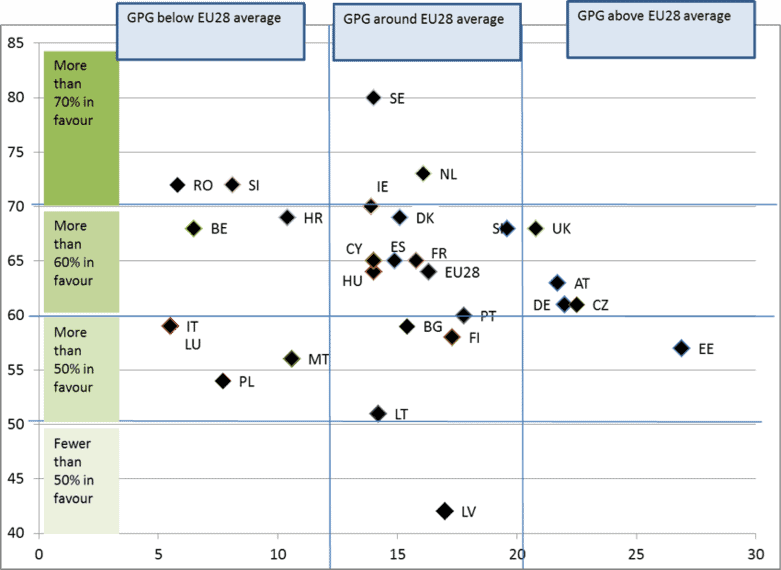
Christine Aumayr-Pintar
Measures to promote gender pay transparency haven’t been delivered yet in half of Europe – making EU level legislative action to speed up implementation an option. Here’s what we know about the measures from countries that have been early adopters.
The aim of overcoming differences in pay between men and women has been in the DNA of the EU ever since its foundation. All Member States have agreed that equal work or work of equal value between men and women shall be paid the same. The latest – and most concrete – initiative at EU level to reduce the gender pay gap was the Commission’s 2014 Recommendation (2014/124/EU). Here it suggested that every Member State ought to adopt (or adapt) at least one out of four measures ensuring greater transparency of pay:
- the individual right to request pay information
- compulsory company level gender pay reports for companies with more than 50 employees
- more analytical gender pay audits for larger companies
- to ‘encourage’ social partners to take the matter into account in their collective bargaining.
Only half of the Member States followed the Recommendation
This did generate movement in some parts of Europe: Germany introduced the right to request information on pay for 14 million employees and also, along with other countries such as the UK and Lithuania, the obligation on companies to carry out gender pay reports. Ireland, the Netherlands and Italy have also ‘advanced drafts’ of such legislation in the pipeline or desk-drawer. Yet, the overall degree of implementation of this Recommendation has been poor. In more than half of the Member States (!) virtually nothing has happened, leading the Commission to start reflecting about using the legislative stick: In its Action plan 2017-2019 on tackling the gender pay gap, the EC announced it would ‘assess the possibility of targeted amendments to the Gender Equality Recast Directive by looking at the need for and possibility of making some or all of the measures on pay transparency […] binding’.
First experiences with gender pay transparency
We have looked at first experiences with gender pay reports and audits – from first mover countries which already had evaluated the use of these measures with evidence-based research: Austria, Denmark, Finland and Sweden. The following ten points can be distilled from the research – and beyond:
- Simpler versions of pay reporting requirements didn’t pose major obstacles for companies.
- But reports and auditing requirements only became meaningful when they added more complex and thorough data, including various components of pay beyond basic salaries and extra information, such as length of working experience or tenure of the employees.
- Rolling the measures out can be bumpy at the beginning (see UK experience here). Phased approaches in which companies of decreasing size are added in seem to work.
- Clarity from the legislator as to who is required to compile the reports, what they should contain, who shall be involved at company level , what template could be used, what should be done with them and what are the consequences if they are not compiled, makes everyone’s life easier.
- Larger companies find it easier to implement them. Support measures should therefore be specifically focused on medium-sized companies.
- In order to avoid making such reports a bureaucratic accounting exercise, joint compilation, discussion and agreed follow-up between management and employee representatives is a recipe for success.
- They work best when there is a genuine interest and openness among company level actors to look into the data – next to a supportive environment of social partners and governments.
- Gender pay reports are unknown and unnoticed by the general public, according to Eurobarometer.
- But the public would be supportive of introducing them – irrespective of the level of the gender pay gap in their country: About two-thirds of Europeans said in a special Eurobarometer that they would be supportive.
Support for public pay reports and level of gender pay gap in 2017

Note: GPG = gender pay gap. Recent gender pay gap data for Greece is not available. Vertical axis: percentage of respondents being ‘strongly’ or ‘somewhat’ in favour on the question: ‘Would you be in favour of or against publishing the average wages per job type earned in the organisation or company where you work by each sex? (%)’; Horizontal axis: unadjusted gender pay gap, hourly earnings, full-time – figures from 2015 or most recent data available.
Source: Author’s depiction based on European Commission (2017b), Eurobarometer 456 and Eurostat, [earn_gr_gpgr2].
- Pay transparency can be a two-edged sword, though, as Todd Zenger argued: In environments where performance is hard to measure, combined with commonly observed overestimation of one’s own performance, transparency reports can do more harm than good. Increased fairness with more equal, yet compressed, pay can lead to general dissatisfaction and resignations among high performers.
In my view the ‘European variant’ of pay reports and audits, in which employee representatives are, ideally, closely involved in the compilation, analysis and follow-up can help to soften the sharpness of the second edge of the sword: When employees have confidence that the issue of fairness and equal pay for equal work is regularly monitored and addressed on their behalf, they don’t need to know exactly or even on average how much their peers are earning, leaving still sufficient room for companies to reward performance. So the most important lesson learnt from the first mover countries is to ensure that employee representatives are available, sufficiently resourced, trained and involved throughout the whole process.
See also: Eurofound (2017), Developments in working life in Europe 2016: EurWORK annual review, Publications Office of the European Union, Luxembourg, Chapter 6 on pay inequalities: Evidence, debate and policies.
Christine Aumayr-Pintar is a research manager in the working-life unit at Eurofound. She works on industrial relations and working conditions, focusing on pay setting, minimum wages, gender pay transparency, industrial action and social dialogue.
